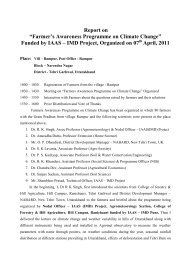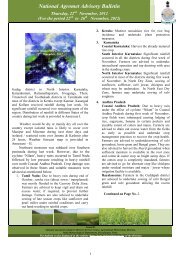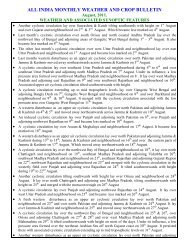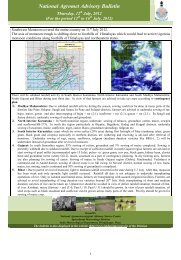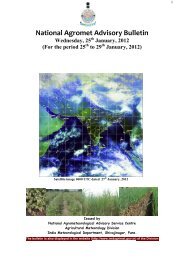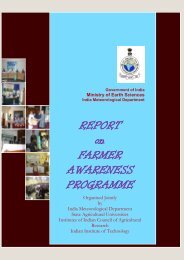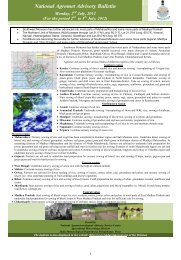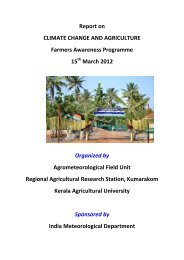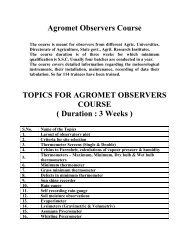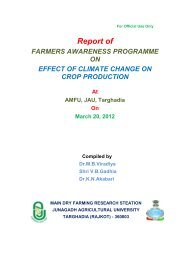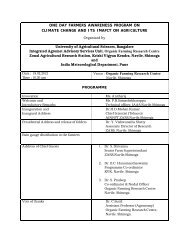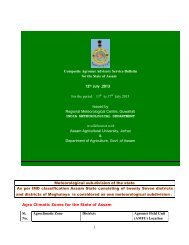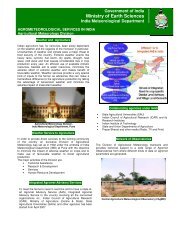Jorhat - Agricultural Meteorology Division
Jorhat - Agricultural Meteorology Division
Jorhat - Agricultural Meteorology Division
Create successful ePaper yourself
Turn your PDF publications into a flip-book with our unique Google optimized e-Paper software.
Report of Farmers' Awareness Programme for <strong>Jorhat</strong> AMFU Unit<br />
A 2 days Farmers' Awareness Programme on, "Climate Change & Agroadvisories "<br />
was organised by the Department of Agrometeorology, Assam agricultural University on 16 th<br />
and 17 th March,2010. The seminar was sponsored jointly by India Meteorological Department<br />
under Ministry of Earth Sciences, Government of India and Central Research Institute for<br />
Dryland Agriculture (ICAR). Besides agricultural scientists, media person and 110 farmers<br />
participated in the Awareness Programme.<br />
The inaugural session started with the welcome by Dr.L.K.Hazarika, Dean,<br />
Faculty of Agriculture, AAU, <strong>Jorhat</strong>. In his address, Dr Hazarika highlighted the<br />
contributions of the AAU in varietals development related to pulses, oilseeds, jute, wheat and<br />
boro paddy to the farmers. Dr. Durgeswar Das, DPGS and Dr. S.N.Dutta, ADE, Directorate<br />
of Extension of Assam <strong>Agricultural</strong> University also addressed the farmers on the<br />
occasion.<br />
Dr K.K.Nath, Prof. and Head cum Principal Nodal Officer of the Agromet Advisory<br />
Service, AAU, Joraht unit explained in length about the objective of the Awareness<br />
Programme. He informed the house that the overall goal of the Awareness Programme was to<br />
make farmers more self reliant in dealing with weather and climate issues that affect<br />
agricultural production on their farms and to increase interaction between the fanners and the<br />
Agro-meteorological service providers. He also narrated briefly about, the importance of<br />
agro-advisory service in the context of changing weather scenario in Assam. The inaugural<br />
session ended with vote of thanks by Dr(Mrs) P.G. Khanikar, Associate Prof., Dept of<br />
Agrometeorology. The programme was anchored by Dr. Seuji Neog, Associate Prof., Dept. of<br />
PBG.<br />
There will a plan for distribution of Rain gauge among the farmers. But due to lack of<br />
reaching the rain gauge in proper time, it was not possible to distribute the rain gauge in the meeting.<br />
It will distribute among the progressive farmers of different block of jorhat through the Programme<br />
Coordinator of KVK.<br />
In the technical session Dr KK Nath delivered a lecture on "Farmers Awakening to<br />
Changing Climate." He dealt in length about different issues related to global warming and<br />
agricultural practices. He discussed about strategies to be adopted by the fanners in aberrant<br />
weather condition. He appealed to the farmers to look for every single opportunity amidst<br />
unfavorable weather condition to maintain/increase the level of their farm production. He further<br />
stressed the importance of weather based agro-advisories in farm management.<br />
In the post lunch session, Dr P Neog, Asssociate Professor, BNCA, Biswanath Chariali<br />
elaborated on the economic importance of agro-advisory bulletins to the fanning community<br />
with concrete examples. He explained the need of medium range weather forecast and how to<br />
look for forecasts provided by the India Meteorological Department online using internet<br />
facility.<br />
Dr. J. Deka, Prof., Dept of Agromony, AAU delivered a lecture on “Climate Change<br />
and Agriculture”. He describes how the climatic risk like flood, drought etc. affects the<br />
agriculture. He also describes the remedial measures of these risks.<br />
Dr. Deep Jyoti Rajkhowa, Prof., Dept of Agronomy, AAU delivered a talk in 2 nd day<br />
on the impact of climate change on weed management. He described how the weed control<br />
will difficult in changed climatic scenario.
Dr. Bipul Sarmah, Prof., Dept of Extention Education, AAU delivered a talk in 2 nd day<br />
on the role of farming community in changed climatic scenario. He discussed about the<br />
changing the cropping pattern along with the changed climate.<br />
There was also a very interesting interactive program with the farmers. Some<br />
progressive farmers put many intelligent queries to the experts and, on their part, the<br />
experts satisfied the farmers regarding their queries.<br />
Feedbacks from the farmers were also collected through supplying questionnaires<br />
to them. The format of the questionnaires is attached herewith as Annexure I. Opinion of<br />
the farmers observed in the feedbacks is summarized and presented below:<br />
As many as 67 farmers expressed the opinion that rainfall was the most important<br />
parameter that influenced agricultural production. It is seen from the feedbacks that<br />
among the 105 farmers of the 1 st day Programme, only 46 farmers have seen the rain<br />
gauze. As many as 35 farmers expressed that they took farm decisions following all the<br />
given means as given in the questionnaires. Interestingly, as many as 70 farmers opined<br />
that they have changed crops based on climate variability in the recent years. Among all<br />
the farmers, only 15 expressed that they followed pesticide application and as many as 53<br />
expressed that they followed eco-friendly/IPM practices in controlling pest & diseases in<br />
their fields. More than 90% of the farmers recorded that they listened and followed the<br />
Agromet Advisories given by the Agromet Unit and they also expressed that the<br />
Agroadvisories were useful in improving crop yields. As many as 72 farmers felt that<br />
conservation of natural resources like water, soil, biodiversity etc play a dominant role in<br />
curtailing the impact of climate change. About 67 farmers expressed that they would like<br />
to implement use of organic matter as a measure to save the Earth from global warming.<br />
About 60 farmers were of the opinion that one-day programme is useful in learning new<br />
things about weather.<br />
Some of the Selective Photographs:<br />
Left hand side: Lighting by Dr.L.K.Hazarika, Dean, Faculty of Agriculture, AAU, <strong>Jorhat</strong> in the inaugural<br />
session<br />
Right hand side: Lighting by KKNath, Prof. & Head, Dept of Agrometeorology, AAU, <strong>Jorhat</strong> in the<br />
inaugural session
Left hand side: Dr. D.J. Rajkhowa, Prof., Dept of Agronomy, AAU delivered a talk on the impact of climate<br />
change on weed management<br />
Right hand side: Dr K.K.Nath, Prof. and Head, Dept of Agrometeorology, AAU, Joraht unit explained in length<br />
about the objective of the Awareness Programme.<br />
Left hand side: Parts of Farmers present in the 2 nd day programme<br />
Left hand side: Parts of Farmers present in the 1 st day programme
FEED BACK of the Farmers<br />
Total Farmers attended: 105 Venue: Assam <strong>Agricultural</strong> University, <strong>Jorhat</strong> Date: 17/03/2010<br />
1 2 3 4 6 7 9 10 11 12 14 15 17 19 20 21 22<br />
67 6 4 - 62 25 70 17 52 33 46 16 5 9 1 3 9 10 35 70 9 44 4 3 3 20 15 53 54 26 79 - 88 - 92 1 28 52 72 11 84 - 21 67 58 24<br />
Rainfall<br />
Temperature<br />
Sunshine<br />
April<br />
May<br />
June<br />
December<br />
January<br />
June/July<br />
August/September<br />
Have seen<br />
Haven’t seen<br />
Experience<br />
KVK<br />
AAS<br />
BLAO<br />
TV<br />
Radio<br />
All above<br />
YES<br />
NO<br />
Cloudy weather<br />
Low temperature<br />
Rainfall<br />
High Humidity<br />
High temperature<br />
Pesticide application<br />
Eco-friendly/IPM practices<br />
YES<br />
NO<br />
YES<br />
NO<br />
Listen and Follow<br />
Not Listen<br />
YES<br />
NO<br />
YES<br />
NO<br />
YES<br />
NO<br />
YES<br />
NO<br />
Less application of fertilizer/pesticides<br />
Use of more organic matter<br />
YES<br />
NO
ANNEXURE- I<br />
Questionnaire<br />
1. Which is the most important weather parameter that influences agricultural production in<br />
your opinion Rainfall Temperature Sunshine Wind speed<br />
Relative Humidity<br />
2. Which months are the hottest and coldest in your region, if known, give the values<br />
April May June December January<br />
3. When (month/week) do you receive highest rainfall Indicate the average annual rainfall of<br />
your region<br />
4. Have you seen any time the instruments that measure rainfall and temperature Can you<br />
name them<br />
5. Did you notice any increase/decrease in the following weather parameters over the years <br />
Increase Decrease No change<br />
a. Rainfall<br />
b. Summer temperature<br />
c. Winter temperature<br />
d. Cyclone<br />
e. Heavy rainfall events<br />
f. Dust storms<br />
g. Frost<br />
h. Pests/diseases<br />
6. Farm decisions are taken through<br />
Traditional knowledge /experience<br />
Newspapers<br />
KVK<br />
Agro Advisory Services<br />
Block level <strong>Agricultural</strong> Officer<br />
Television<br />
Radio<br />
Above all<br />
7. Have you changed any crops based on climate variability in the recent years<br />
YES<br />
NO<br />
8. If yes, reasons for it and what crops have been changed<br />
Crops<br />
Earlier crops<br />
Changed crops<br />
Reasons<br />
Non-profitable<br />
Not yielding due to changes in weather<br />
Labour problem<br />
Crop loss due to damages by extreme weather events<br />
Less irrigation<br />
Crop yields are not stable<br />
availability<br />
Increased attack by damages of pests/diseases<br />
9. Which are the following weather parameters and their combinations that influences pests<br />
and diseases Cloudy weather High humidity High<br />
temperature<br />
Low temperature Rainfall Wind speed<br />
10. Are you following pesticide application in controlling pests/diseases or any ecofriendly/IPM<br />
practices
11. Do you feel that in spite of more pesticides are being used to control pests/diseases, yet<br />
the pest damage did not reduce YES NO<br />
12. Do you feel that more application of pesticide/insecticides harm the environment<br />
YES<br />
NO<br />
13. If yes, what action do you suggest to reduce their applications<br />
Use of scientific methods<br />
Apply only when it is essential<br />
Use of bio-pesticides(like neem<br />
concentrate)<br />
Release of natural enemies(bio-control<br />
agents)<br />
14. Do you listen and follow the advisories given by the Agromet Unit <br />
listen and follow listen but not follow not listen<br />
15. Do you think that weather-based farm advisories are useful in improving the yields <br />
YES<br />
NO<br />
16. Approximately how much benefit did you realize by following advisories provided by the<br />
respective Agrometeorologist Profit Rs.______________<br />
17. Have you any time incurred losses by following the advisories<br />
YES<br />
NO<br />
18 If yes, what type of advisories that put you to loss<br />
19. Don’t you feel that conservation of natural resources like water, soil, bioderversity,<br />
mangroves etc., play a dominant role in curtailing the impacts of climate change <br />
YES<br />
NO<br />
20. If so, do you take a pledge to conserve all the natural resources like saving in<br />
irrigation/minimum tillage, reducing pollution levels in water and air and save for future<br />
generation.<br />
YES<br />
NO<br />
21. Can you name at least one measure that you would like to implement to save the earth<br />
from global warming such as reducing the use of free power, less application of fertilizer and<br />
pesticides use more organic manure<br />
22. Do you think that One-day Programe is useful in learning new things about weather <br />
YES<br />
NO



